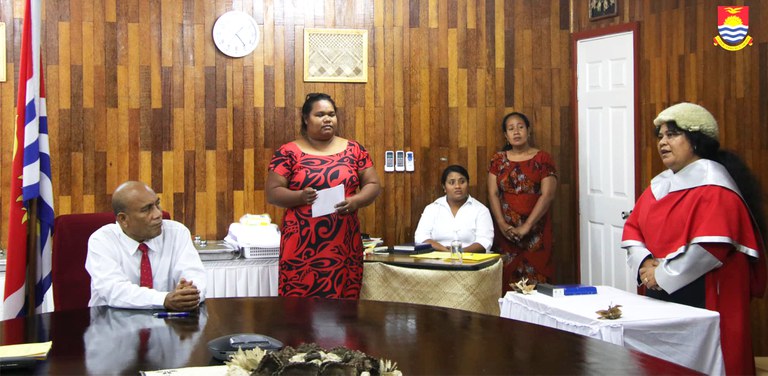Kiribati’s war on its expatriate judges provokes concern
2022.11.02
Wellington
 Kiribati Attorney General Tetiro Semilota speaks at her swearing in ceremony to become acting chief justice on Oct. 29, 2022.
Kiribati Attorney General Tetiro Semilota speaks at her swearing in ceremony to become acting chief justice on Oct. 29, 2022.
Kiribati’s government is facing international scrutiny after its attorney general was appointed acting chief justice, part of a political battle that has compromised the independence of the Pacific country’s judiciary.
Kiribati, which has relied on foreigners to fill top judicial positions, has no senior judges after President Taneti Maamau earlier this year attempted to deport a High Court judge who is the husband of the country’s opposition leader and suspended the chief justice and three other judges.
Attorney General Tetiro Semilota was sworn in as the top judge on Oct. 28 in front of Maamau and cabinet ministers, the president’s office said in a statement released a day after the ceremony. It is unclear whether Tetiro Semilota remains attorney general. Maamau’s office did not respond to a request for comment.
“This current government in Kiribati is not particularly concerned about how it is perceived by outsiders,” said Tess Newton Cain, who leads the Pacific Hub at Griffith Asia Institute. “It’s a very sort of self-referential inward looking government led by an inward looking president,” she said.
Semilota’s appointment as chief justice, Newton Cain said, could undermine the separation of powers between the branches of government, which is meant to prevent abuses of power, and violate Kiribati’s constitution.

Maamau, in his Oct. 29 statement, said Semilota’s appointment was historic as she is the first woman and indigenous Kiribati citizen to become the country’s chief justice. The government is committed to upholding the rule of law, he said.
Kiribati, home to some 120,000 people, is among the poorest countries in the Pacific. Comprising about three dozen low-lying atolls, it is threatened by coastal erosion and higher sea levels. Australia, China and New Zealand are its three largest development aid donors.
The chief justice appointment has drawn incredulity and concern in the region. Solomon Islands opposition leader Matthew Wale said in a Twitter post that it made a “laughing stock” of Kiribati’s government. A regional mechanism is needed to help countries address “such ludicrous decisions,” he said.
The United Nations special rapporteur on the independence of judges and lawyers, and bar associations in Australia and New Zealand, had already expressed concern about the assault on the independence of Kiribati’s judges.
Australia’s Department of Foreign Affairs and Trade said on Thursday that it was “encouraging the resolution of these issues as part of our ongoing engagement” with Kiribati’s government.
New Zealand is concerned by Semilota’s appointment “given the potential conflicts of interest involved” and is seeking further information from Kiribati’s government, a Ministry of Foreign Affairs and Trade spokesperson said. “We have previously registered New Zealand’s concerns for the independence of the judiciary with the Government of Kiribati at the highest level.”
New Zealand’s High Commissioner to Kiribati didn’t attend a special High Court session on Wednesday to welcome the new chief justice, the spokesperson said.
The Australian High Commissioner also didn’t attend but had a pre-existing commitment. Annual talks between senior Australian and Kiribati officials went ahead as planned on Tuesday.
Kiribati changed its diplomatic recognition to China from Taiwan in 2019 and last month Maamau effusively praised China’s economic development in an interview with Chinese state media that was published during the annual National Congress of China’s ruling Communist Party.
Former Kiribati president Ieremia Tabai said the judicial crisis was a domestic issue, driven by the government’s aim to destabilize the political opposition, Radio New Zealand reported on Wednesday.
He said Maamau’s government could face a no-confidence vote in parliament next month.
Kiribati’s government had sought to limit the tenure of High Court judge David Lambourne, an Australian citizen who is married to Kiribati opposition leader Tessie Lambourne.
He agreed under duress to a backdated three-year term after the Kiribati government stopped paying his salary and refused to allow him on any repatriation flight during the Covid-19 pandemic, according to Diego García-Sayán, the U.N. special rapporteur on judges.
Kiribati attempted to deport him after he returned to the country in August this year and dismissed expatriate New Zealand judges when Lambourne’s appeal against his own suspension was due to be heard.







